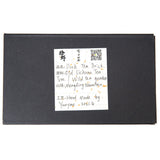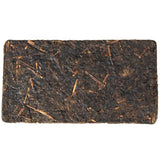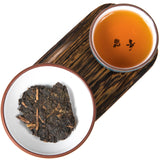– This enchanting smell of old wood, fresh dates, and burning charcoal! It enthralls the senses, invigorates the mind, and salivates my mouth! Sifu, where does it come from?
– That, young one, is the magic of Mengding dark tea. People living on the ridges of Meng Ding have been perfecting the art of making this delicious tea for centuries, as now you and I shall follow.
This Dark Tea (or Hei Cha – 黑茶)is a traditional Sichuan favorite. Coming from the famous Mengding mountain, this tea inherits a centuries-old tradition of Dark tea production in this region. Mengding Heicha is a warm, sweet tea with a unique flavor. This fermented tea from China is equally good for brewing as well as for simmering.
This Dark tea is grown on Sichuan’s Meng Ding Mountain. The tea bushes belong to an old local variety, Old Chuan Tea (Lao Chuan Cha – 老川茶). Most of the tea trees were planted back in the 50s of the last century, between 700 and 1200m above sea level. Today, they grow freely in a semi-wild state, unattended by humans.
To make this Hei Cha, Mr. Yun, the tea master, uses buds along with up to three leaves. He processes them using a traditional method, including charcoal fire roasting and clean above-ground fermentation. In April, farmers pick the tea leaves from the wild tea garden. Then, Mr. Yao quickly roasts them in a pan over a charcoal fire to stop the oxidation. Then, he sets up a special enclosure with a plankboard floor and a bamboo fence. There, he stacks up the freshly roasted tea leaves for further processing. Under the combined action of heat and moisture, the leaves undergo a transformation for a period of 50 days. Then, they get roasted on a charcoal fire. Finally, he presses the Maocha by hand into tea bricks. In line with the traditional ways, every step in the processing of this tea is done by hand.

The result is a mild, mellow tea with a special “Meng Ding flavor”. The soup is bright red, with a clear and transparent look and feel. The aroma carries notes of wood and red dates with a slightly roasted flavor. This dark tea yields a dozen brews without losing its energy and intensity.
Unlike other teas, dark tea is excellent for daily use, even for those with sensitive stomachs. Fermentation has softened the taste and enhanced the rich antioxidant content of the raw tea leaves. It protects the delicate inner membranes of the digestive organs while enhancing their function. According to Chinese medicine, Dark tea is gently warming and suitable for the colder months. You can brew it using the Gong Fu Cha method or steep it in a Western-style tea mug. And don’t throw away the leaves after you’re done with the brew! Unlike the other teas among the six types of tea, Dark Tea can (and should) be boiled after brewing! You can put the tea leaves in a small pan, add about 1/2 liters of water, and simmer them over low fire for 10-15 min.
Watch a Video on How to Boil Tea
- Place of Origin: Mengding, Meng Mountain, Ya'an, Sichuan Province, China
- Altitude: 700-1200m
- Harvest / Production Dates: April 2024
- Picking Standard: Bud and three to four leaves
- Aroma: Clean aroma with notes of berries, oats and honey
- Taste: Sweet and sour, with notes of berries and pine nuts
- Cultivar: Lao Chuan Cha (老川茶)
Brewing guidelines:
 1g per 70-100ml
1g per 70-100ml  1g per 20ml
1g per 20ml 




